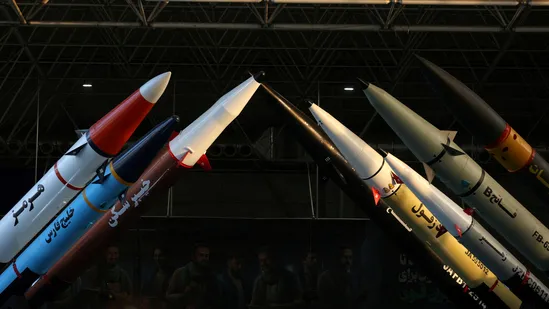Iran Prepares Missiles Amid Trump's Threat of Bombing and Tariffs

Synopsis
Key Takeaways
- Iran has readied missiles in response to Trump's threats.
- Trump warned of severe military actions if no agreement is reached.
- Tehran maintains its opposition to direct negotiations under pressure.
- Secondary tariffs on Iran and Russia are under consideration.
- Uranium enrichment has significantly surpassed agreed limits.
Tehran, March 31 (NationPress) Just hours after U.S. President Donald Trump made threats of bombing and imposing secondary tariffs against Iran, the Iranian armed forces have reportedly positioned missiles for a potential counteraction against Washington.
According to a statement shared on X, the Iranian military announced, "Reports obtained by the Tehran Times suggest that Iran's missiles are loaded onto launchers in all subterranean missile facilities and are primed for launch. Opening this Pandora's box will incur a steep price for the U.S. government and its allies."
The Tehran Times has reported that a considerable number of missiles are ready for launch and are stored in underground sites throughout the nation.
On Sunday, Trump had warned Iran of bombings and secondary tariffs if Tehran failed to reach an agreement with Washington regarding its nuclear program.
In his initial comments since Iran rejected direct talks with Washington last week, Trump stated to NBC News that U.S. and Iranian officials were in communication, though he did not provide further details.
"If they don't make a deal, there will be bombing," Trump said during a phone interview.
"It will be bombing the likes of which they have never seen before," he added.
Trump also mentioned the possibility of implementing secondary tariffs similar to those imposed four years ago if no agreement is reached.
In response, Iran communicated with Trump via Oman, urging for a new nuclear agreement, asserting that it would not engage in direct negotiations with the U.S. while under its maximum pressure campaign and military threats, as noted by Tehran's Foreign Minister on Thursday.
During the interview, Trump reiterated threats of secondary tariffs aimed at purchasers of goods from both Russia and Iran.
Last week, he signed an executive order that authorized such tariffs on buyers of Venezuelan oil.
Trump did not provide details regarding these potential tariffs.
During his first term from 2017-2021, Trump withdrew the U.S. from a 2015 agreement with Iran and world powers that imposed strict limits on Tehran's disputed nuclear activities in exchange for sanctions relief.
He also reinstated extensive U.S. sanctions. Since then, the Islamic Republic has significantly exceeded the agreed limits in its advancing uranium enrichment program.
So far, Tehran has dismissed Trump's warnings to negotiate or face military repercussions.










